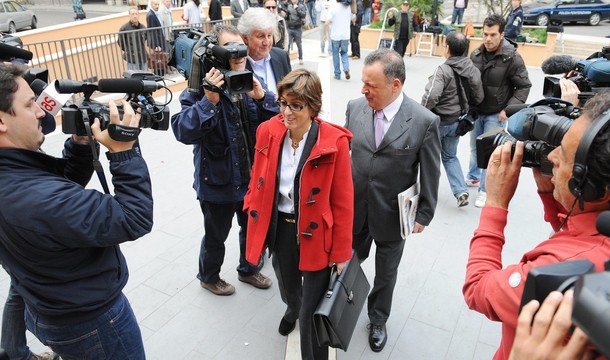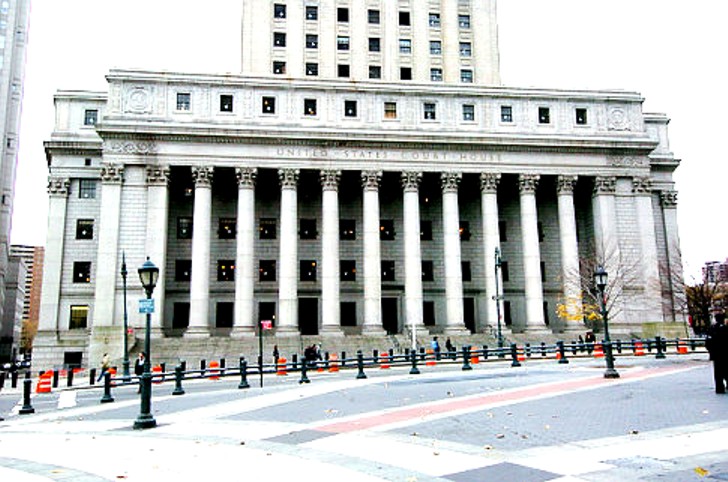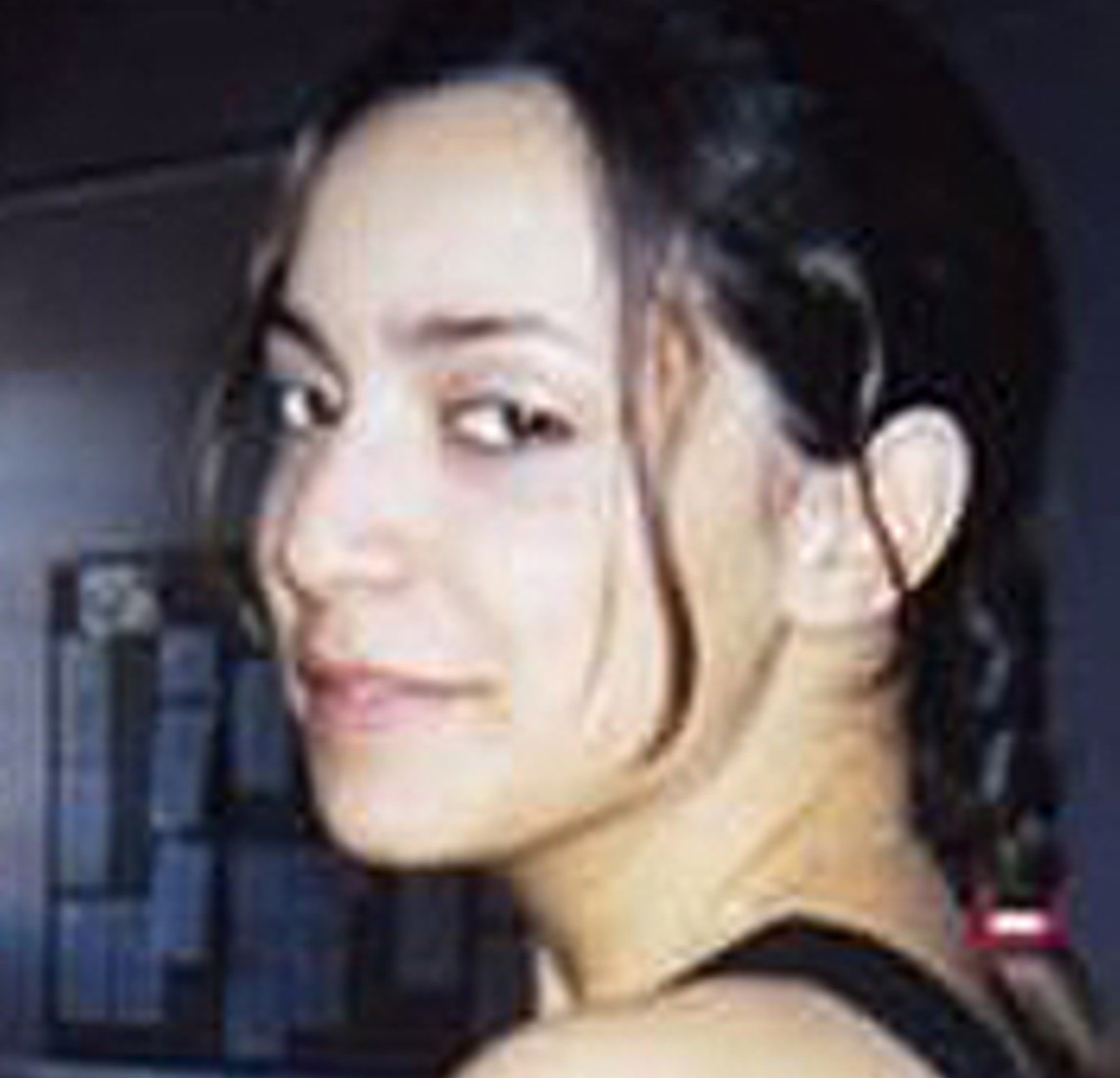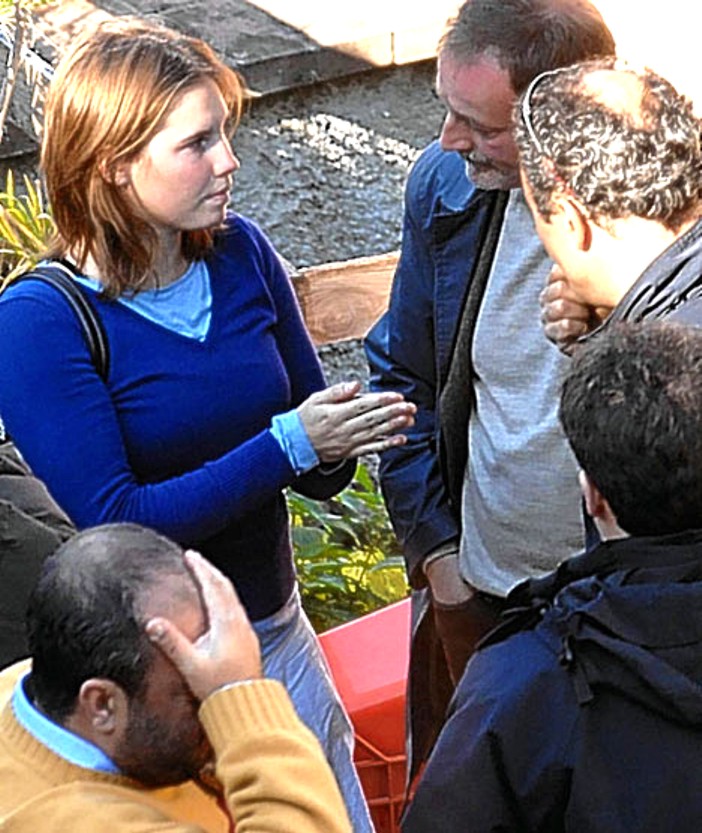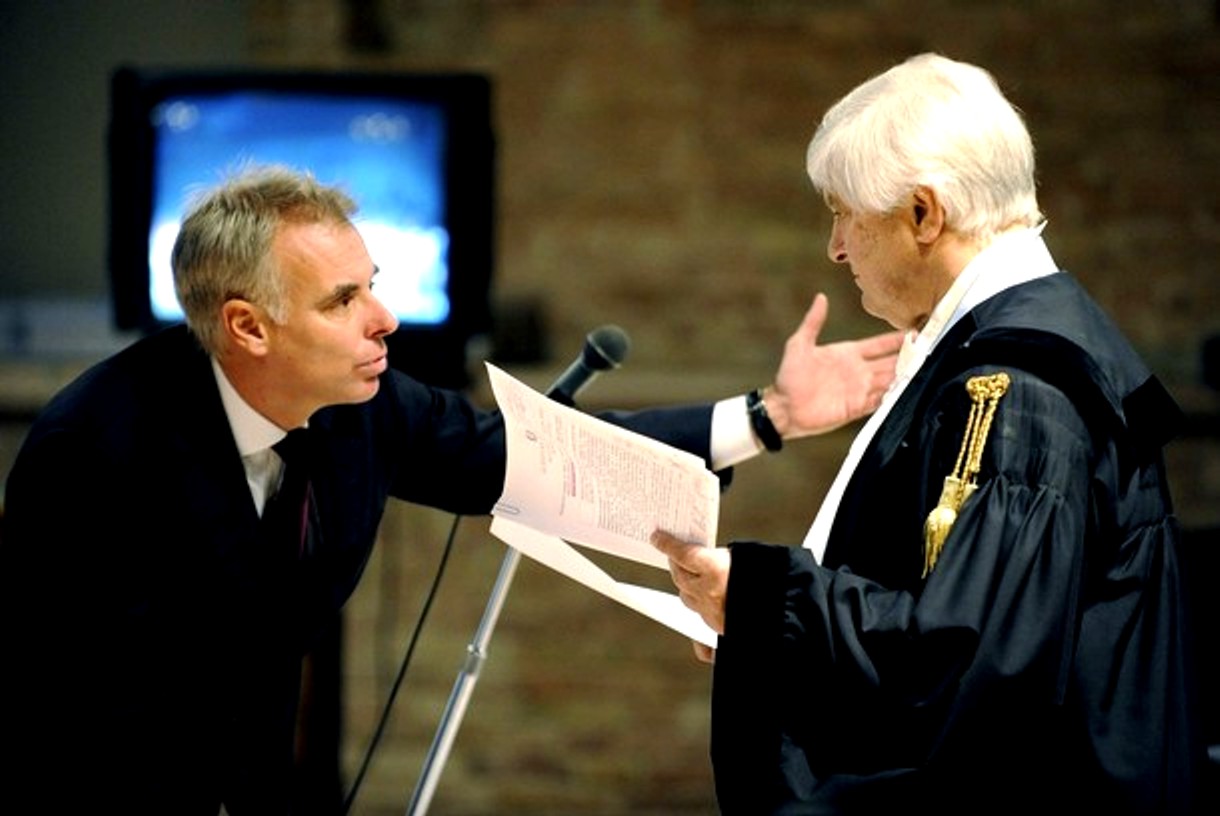
Category: The officially involved
Saturday, February 12, 2011
Sollecito Defense Team Breaking From Knox Defense Team On Legal Measures To Stop Lifetime Movie
Posted by Peter Quennell
The Amanda Knox team of Ghirga and Delle Vedova were ready to stop by legal means the showing of the Lifetime movie in Italy.
We presume they were only willing to go that far and no further because there are various signs that Edda Mellas and Curt Knox had a hand in the generation of this movie - not least that they have never denied it or decried it. Chris Mellas confirmed that they were helping out in his candid announcements that he tried to get Panettiere face to face in Capanne with Amanda Knox.
But there is already a huge separation between the Knox and the Sollecito defense teams - Giulia Bongiorno and Luca Maori (image above) have no liking at all for the runaway train of xenophobic conspiracy theorists.
And of course Raffaele Sollecito STILL does not confirm Amanda Knox’s attempted fifth alibi for the night that she was at his place all along.
We have already warned that the fact of this movie could make things very much worse for Amanda Knox.
Now it looks like this is happening. Giulia Bongiorno and Luca Maori want the movie delayed worldwide on the basis that it could SERIOUSLY damage their client’s prospects.
The large Italian news service ADNKronos is now reporting that if Lifetime do not confirm by this next Monday that the movie is to be held back until after the appeals are over, they will file suit in New York Federal court in Manhattan (image below).
If there is a Federal court session on this, we should be able to report from the front lines, hopefully with some shots, on the Lifetime producers trying to defend their bizarre movie.
Looking forward.
Friday, February 11, 2011
Perhaps Heeding Meredith Family Pleas And Our Open Letter Lifetime Claim Movie Now Less Shrill
Posted by Peter Quennell
If we are reading this somewhat cagey explanation by Lifetime executive producer Craig Piligian correctly, the scenes with Meredith have almost disappeared.
Lifetime is set to premiere the movie on February 21, but the channel has slightly altered their marketing in response to criticism from both Knox’s lawyers and the family of victim Meredith Kercher.
The channel recently removed the original teaser-trailer for the movie, which stars Hayden Panettiere as Knox, from its website and YouTube, and today replaced it with a new, slightly edited version.
The new promo no longer includes scenes depicting Kercher being assaulted, which caused a stir in the U.K., where she is from, and which her father called “absolutely horrific.”
If this is true then we have to thank you, Lifetime, for a kind gesture that matters a great deal to Meredith’s family and her many supporters worldwide.
Mr Piligian says the movie will air in the US starting 21 February and the UK and some other markets, but no longer in Italy.
Insiders also confirm that Amanda Knox will not air in Italy due to legal reasons, because Knox’s case is ongoing. Knox’s lawyers had sent a letter to Lifetime, asking the network to pull the clips down, arguing that the movie’s depictions might jeopardize her chance of a fair trial. A Lifetime spokesman confirmed that the network received the letter, but beyond that, they have not commented on the controversy.
We also presume that Lifetime had no wish to pin a calunnia target on their own backs, as the Italian police and investigators and prosecutors may have quietly warned them.
The producers and cast continue to make some rather loopy claims about how controversial the evidence actually is.
“This is a factual drama and we feel we did a very fair and balanced telling of the story, crafting a script from court records and other public documents,” executive producer Craig Piligian tells TV Guide Magazine.
“At the end of the movie people will be wondering whether she really did or didn’t do the things she’s accused of,” he says. “We weren’t leaning one way or another, but took a very even, fact-based approach, which ultimately allows the viewers to make their own decision.”
Amanda Knox is simply accused? Actually she already was unanimously convicted. The Supreme Court of Cassation has already accepted that all three were party to the attack.
Certainly the conviction is not final until Cassation confirms it (probably by late summer 2012) but that existing Cassation position really means it is all but game over. And Capanne Prison continues of course to be Amanda Knox’s home.
But the auspices behind the movie say they’ve made sure not to take sides in the debate over Knox’s guilt or innocence… Piligian said he screened the movie internally to his staff, and even in-house there’s no consensus on whether or not Knox was involved in the crimes. “Everyone’s divided, and the viewing public will likely be divided as well… That’s what makes this such a great story.”
No consensus? Try again. Read the voluminous evidence rather than simply watching a hedging semi-fictional film
We are finding that maybe 98 out of every 100 bright people who read the Massei report and the Micheli summaries do not have the slightest difficulty seeing that the case has been made and the first verdict a fair one.
We will watch the Lifetime movie for sure on 21 February.
We will be curious to see if Lifetime somehow depicts what a sad drug-driven slide into dependency and desperation the seemingly not-quite-right Amanda Knox appeared to be embarked on.
What a deservedly friendless, obsessive and bizarre person the heavy drug user Raffaele Sollecito seemed to be, despite all his deeply concerned father’s best efforts, in real life.
And what an exceptional fast-track student with an amazing future already mapped out the real victim, Meredith, really was. We believe Lifetime may have picked up some strong vibes of that.
Wednesday, February 09, 2011
On The Effects On Amanda Knox Of Her Movie Alter Ego Hayden Panettiere
Posted by Hopeful
An ABC News headline: “Amanda Knox Felt Ill When She Saw Herself Portrayed in New Movie”
Nikki Battiste.states that Knox was tearful in her weekly phone call home after having seen the trailer of the movie on prison TV news. Chris Mellas quoted her, “I was physically ill when I saw the images. I thought I was going to throw up.”
This reaction seems to spring from the strange feeling Knox had when seeing “a girl who looked like her, dressed like her, playing her life.” Mellas explains her frustration at having no control over her life or how her life is portrayed.
Perhaps this seeing herself through objective eyes is shaking up her fragile sense of identity. She explored that theme in her appeal speech, all too fully for the occasion. She’s not “that girl” painted by the prosecution.
Maybe in this movie she is reminded of all the glories that were lost seeing the colors and happy scenes of bouncing carefree Hayden/herself flitting around Perugia at the university that she so loved; and the love scene with Raffaele, the picturesque architecture of Perugia with the film’s golden lighting, even her long hair as Hayden wears wig, treasured times of joy.
This film renews those days of wine and roses, however brief, and it must be horrifying to have traded all that freedom for the current reality.
Nikki Battiste reports, “Her family said she is not aware of the magnitude of the press surrounding her life, and that she avoids watching television and reading newspapers.”
That sounds inaccurate or blatantly false, because she faces a jungle of reporters and cameras each time she enters the courtroom and her family has been in constant contact with her for three years giving ample time to discuss how she is perceived, the press they are surrounded with.
She has probably been informed of every bit of the internet interest in her case, both pro and con. We know this because she refers to the media coverage of her reputation in her appeal speech. Her access to newspapers in prison is no doubt limited, but overall she must surely be apprised of the hubbub about her trial. So her being “not aware” is a total exaggeration, so too perhaps is her reported reaction.
If she sees the movie as veering from the truth of what happened the night of the murder, her reaction may be mixed: grateful that the real details are not known but fearful that even the false rendition makes a case for guilt, and wondering what effect this may have on her appeal, if any.
Case of sowing and reaping here?
She may be bearing the brunt of lies in this movie after having told so many herself. She may be a great deal more envious of Hayden Panettiere than she ever was of Meredith, and resent this lovely actress’s freedom to vicariously take over her life and her sufferings while getting famous and paid for it.
It’s like two actresses vying for a juicy role and one losing out to the other, the loser being Foxy, ironically she being the authentic character and born to play the role. She may hate to lose her claim to fame and the spotlight to Hayden.
She may envy Hayden’s looks and charisma, and feel she has been overshadowed once again, beaten at her own game. It’s hard to imagine how conflicted this movie must make Amanda feel. If she knows her family has received financial benefits from it with some trickle down benefits to herself, that may be some consolation.
Identity confusion from seeing oneself portrayed by another is a powerful mirror held up to the self even if one is innocent. If one is not very self-aware to begin with, seeing oneself caricatured or portrayed by another like a game of charades could make a person feel unbalanced and discombobulated.
Amanda is fortunate to have plenty of quiet time without media frenzy or court dates so she can process this dramatic development.
It’s equally possible that her tears and nausea are an act equal to Hayden’s, initiated by her shrewd instinct. They could be a falsehood concocted by her family to camouflage the fact that she’s secretly revelling in every minute of increased notoriety. She may be silently thanking Hayden for promoting her status on TV.
For that matter it might not be mutually exclusive, this love of the limelight once again, but anger that she has been cut out as scriptwriter. The issue she has with “no control over her life…how her life is portrayed” does sound rather like the bitter tears of a wounded egomaniac.
Friday, February 04, 2011
Open Letter To Everyone Remotely Involved In Lifetime’s Crass Enterprise “Murder on Trial in Italy”
Posted by Peggy Ganong
Video version and all co-signatories of the letter below
The parents of Meredith Kercher are not the only ones who are appalled and saddened by the making of the soon-to-be aired Lifetime movie “version” of their daughter’s brutal murder, which occurred in 2007 while she was an Erasmus scholar in Italy. Though we cannot begin to truly imagine the depth of their ongoing pain, we can certainly empathize with them. And we can share their outrage at the very idea of showing graphic footage that purports to depict “what happened” to their beloved daughter. That John Kercher, Meredith’s father, was led to believe otherwise just makes matters worse.
At the risk of creating yet more publicity ““ which could ultimately play into the hands of the producers and others associated with this telefilm, commissioned by and scheduled to air on the US cable channel Lifetime ““ we wish to condemn, in the strongest possible terms, everyone who has played a role in bringing this crass enterprise to fruition. The film is not just premature and untimely ““ though it is indeed both, since two of the three unanimously convicted in December 2009 for their role in Meredith’s death are currently awaiting the first of two appeals, which are automatic in Italy ““ it is also just plain wrong. And it will continue to be so in ten, twenty or thirty years’ time.
What possible justification could there ever be for inflicting this kind of pain on the real-life, grieving family of Meredith Kercher? Does it enhance our understanding of this heinous crime in any way? No, it does not. Does it serve to dissuade others from engaging in such acts? No, it does not. On the contrary, it breeds the kind of callous disregard for human life and lack of empathy that led to this gratuitous act of violence in the first place and that apparently characterizes those who have produced, directed and otherwise participated in the project.
In some respects, the damage is done as far as Meredith’s family are concerned. The footage is out there thanks to the efficiency of the World Wide Web. Now, there are two ways to bring partial reparation and maybe a little consolation to the Kercher family: one is to immediately remove all of the offensive footage from the internet, as John Kercher has politely requested. The other is to simply refrain from watching the film when it is broadcast on the Lifetime channel. Use the time to let the people at Lifetime know that you are unhappy with their lack of basic decency and fellow feeling, and that you plan to impose a personal ban in your house on the channel. There is a third way, but only the people at Lifetime can bring it about: that is to quietly but quickly pull the film from its line-up.
Just over three years ago, Meredith Kercher was a living, breathing, joyous young woman. She was also, and still is, someone’s daughter, someone’s sister, someone’s friend and someone’s neighbour. From what we have heard, she brought joy to all who knew her. None of these people deserve the gratuitous pain and suffering that this film and this footage will surely produce. Adding insult to injury, the film apparently focuses in particular on one of the three convicted killers, contributing indirectly to the well-financed and well-orchestrated PR effort intended to garner sympathy for and turn her into a “minor celebrity.” We wonder why, if Amanda Knox’s family and friends are opposed to this celebrity status and tabloidization, they did not do more from the outset to nip this project in the bud. The world knows by now that they have easy and apparently unlimited access to the media. Why have they not used just a few minutes of this access to let it be known that they think Lifetime should scrap the project? Why have they not threatened a lawsuit, claiming that until all appeals are exhausted this kind of film could turn the jury against Amanda Knox?
Like Arline Kercher, Meredith’s mum, we wonder why only the name “Amanda Knox” appears in the title of the film when the victim is named Meredith Kercher. And finally, we wonder why, if Amanda Knox’s family and friends are unassociated with this project, as they claim to be, they are being given an hour of airtime directly following its scheduled showing?
By Peggy Ganong, Seattle
Cosignatories with more to come
Neville Sprigg, England
Dr. Kathy Graham, B.C. Canada
Jane Blakelock Ohio
Claire Bennett, Bristol, UK.
Ann-Marie Thornton, Turkey
Rich Towle, California, USA
Neil Kazwell, St. Louis, MO
Cathy Armer, Boston MA
Nick Kitto, Barcelona, Spain
Mara Loughridge, Florida, USA
Dr. Craig Gerard, Boston, Massachusetts
David Llewellyn Smith, Scotland
Lola Kassim, Cheshire, England
John Crawford, Kent, England
Kevin Mackintosh, Va, USA
Barbara Taylor, Ohio, USA
Sylviane Pompei, France
Andrew James, Germany
Doug Clement, Portland
Samantha Andrews, Derbyshire UK
Patrick Critien, Sliema, Malta
Janet Chapman,Sheffield UK
Theo Stobbe, The Netherlands
Renate Lauditsch, Austria
Laura Watkins, Berkeley, California
Rachel Ross, California, USA
Dr Rosemarie Levine New York, NY
Miriam Bell Khounsary, Seattle
Robert Harrison Kingston-Upon-Hull UK
Amy Revell, United States
Julia Perez, southern Spain
Beth Zaring, Wellston, Ohio
Martha Shamp, Auburn Alabam
Stanley Champ.Garryhinch, Ireland
Heather Good, Whatcom County, WA, US
Katherine Phillips, Barry, Wales
Kris Arnason, Seattle US
Maria Fifield, Buxton, Derbyshire
Simon Gardner Oxford UK
Peter Quennell New York
Monday, January 03, 2011
A Belated Attempt To Do A U-Turn On The Misconceived Loser Of A PR Campaign?
Posted by Peter Quennell
Click above for Nick Pisa in the Sun on winding it all down a few notches.
Right after the whole of Planet Earth was regaled for days on end about how Christmas in Capanne Prison is all really very nice - but also, of course, quite unbearable.
As the huge and incessant PR effort - the first and hopefully last for a convicted murderess in human history - was beamed at the wrong countries (the US and the UK) with the wrong message (Italy is third-world and all of its justice officials corrupt) in the wrong language (English) to the wrong audience (mostly those at a loose end after breakfast) it always looked to us like it was painting Knox into a pretty bad corner. (Deathfish’s post was over two years ago.)
This U-turn if heartfelt is unlikely to have very much effect on public opinion generally in Italy (which is firmly pro-guilt) or the appeals court in Perugia in particular (which seems to be simply going through the motions of checking a carefully argued and decided case).
Being very noisy about being very noisy is certainly a new one on us.
Friday, December 31, 2010
Report #5 On Perugia: The Walk From The Basketball Court Through The Intersection To The House
Posted by SomeAlibi
Wednesday, December 29, 2010
Scientific Statement Analysis: Knox’s Handwritten Note To Police On The Day She Was Arrested
Posted by Peter Hyatt
Statement Analysis
Above: Amanda Knox telling one of her three previous stories to the police outside the house several days earlier.
These posts analyzing key statements are adapted from posts on Statement Analysis at the invitation of TJMK. They are examples of the application of statement analysis, a powerful investigative technique with a very long history of success.
In Meredith’s case such analysis surfaces very telling patterns in the statements of those convicted and undergoing appeal, and also in the statements of those seeking to gain for themselves from the death of Meredith Kercher.
This is an analysis of the transcript of Amanda Knox’s written statement which she handed to Officer Rita Ficarra after noon on November 6, the day she was arrested and sent off to prison at Capanne.
This is very strange, I know, but really what happened is as confusing to me as it is to everyone else.
This opening line appears deceptive.
Dr. Paul Eckman teaches that testifying to memory failure is almost always deceptive. We don’t know what drugs may have impacted her when this statement was made, but failure to remember is most always deceptive, especially in high stress situations.
note the inclusion of sensitive words, “very” strange, and “really” what happened. She notes that others are confused as she is.
I have been told there is hard evidence saying that I was at the place of the murder of my friend when it happened. This, I want to confirm, is something that to me, if asked a few days ago, would be impossible.
Passive language “I have been told” rather than who told her what specifically. But far more telling is the following words within her statement: “I was at the place of the murder of my friend when it happened”. This is not something an innocent person generally says, even in the form of a question, nor in a reflection of others’ words. Someone NOT at the crime scene would not frame these words.
Note that she Wants to confirm, which is different than confirming.
She wants to confirm something that to her, if asked a few days ago, would be impossible. Is the something that she wants to confirm something that would be different to someone else (hence the use of “to me”). She is not being asked “a few days ago”, she is being asked in the present. It appears that her perspective on the “something” she wants to confirm is different now than it was a few days ago.
Also note that “would be impossible” is different than “is impossible.” The addition of “would be” changes her claim from something that already happened into a future event.
I know that Raffaele has placed evidence against me, saying that I was not with him on the night of Meredith’s murder, but let me tell you this. In my mind there are things I remember and things that are confused. My account of this story goes as follows, despite the evidence stacked against me:
“in my mind” is likely deceptive, as it is only in her mind; and not in reality. It is an attempt to avoid the stress of lying.
When people recount events from memory, they generally don’t call it a “story”, a word which conjures images of a made up tale.
On Thursday November 1 I saw Meredith the last time at my house when she left around 3 or 4 in the afternoon. Raffaele was with me at the time. We, Raffaele and I, stayed at my house for a little while longer and around 5 in the evening we left to watch the movie Amelie at his house. After the movie I received a message from Patrik [sic], for whom I work at the pub “Le Chic”. He told me in this message that it wasn’t necessary for me to come into work for the evening because there was no one at my work.
It may be that she and Patrick argued.
Now I remember to have also replied with the message: “See you later. Have a good evening!” and this for me does not mean that I wanted to meet him immediately. In particular because I said: “Good evening!” What happened after I know does not match up with what Raffaele was saying, but this is what I remember.
Weak commitment to the text. If the subject does not own the text, neither can we.
I told Raffaele that I didn’t have to work and that I could remain at home for the evening. After that I believe we relaxed in his room together, perhaps I checked my email. Perhaps I read or studied or perhaps I made love to Raffaele. In fact, I think I did make love with him.
Deceptive use of qualifiers. Again, see Dr. Eckman for this form of deception (memory). Note “perhaps” (qualifier) she made love “to” Raffaele. Sex is a theme in this case, and should be explored by investigators. First she says she may have made love TO Raffaele, then changes it to WITH him in the same sentence. The change in language would need to be explored.
However, I admit that this period of time is rather strange because I am not quite sure. I smoked marijuana with him and I might even have fallen asleep. These things I am not sure about and I know they are important to the case and to help myself, but in reality, I don’t think I did much. One thing I do remember is that I took a shower with Raffaele and this might explain how we passed the time.
We can only commit to what the subject commits; here, she took a shower, but wants everything else to be vague; indicating deception.
In truth, I do not remember exactly what day it was, but I do remember that we had a shower and we washed ourselves for a long time. He cleaned my ears, he dried and combed my hair.
“in truth” is used because she now wants to be believed as is the inclusion of minute detail after reporting memory failure. Sometimes liars add extra, minor detail, in the hope of persuading (see Casey Anthony description of “Zanny the Nanny”).
The shower details are also interesting as it is used to pass time and sexuality. Sex is a theme in her statement. Think how you might describe your night; even if you had a romantic shower, would you include it? If you felt that you needed to, would you give details about ears? Sex is in her mind WHILE giving this statement and should alert investigators to any sexual motive in the crime. Making love “to” not “with” her boyfriend may show that Amanda Knox strongly wanted to please him. This may speak to motive and just how far she went.
One of the things I am sure that definitely happened the night on which Meredith was murdered was that Raffaele and I ate fairly late, I think around 11 in the evening, although I can’t be sure because I didn’t look at the clock.
Lack of commitment to the events noted
After dinner I noticed there was blood on Raffaele’s hand, but I was under the impression that it was blood from the fish. After we ate Raffaele washed the dishes but the pipes under his sink broke and water flooded the floor. But because he didn’t have a mop I said we could clean it up tomorrow because we (Meredith, Laura, Filomena and I) have a mop at home. I remember it was quite late because we were both very tired (though I can’t say the time).
Always note when someone says that they “can’t” say something; it can indicate that if they did tell the information, it would harm them. Here, she “can’t” tell the time; yet has other details down carefully.
“noticed” is passive. Passive languge indicates a desire to conceal and she is withholding information here.
Note also any inclusion of thought/emotion within an event. When someone is giving a verbal or written statement, it has been shown through careful study that in the recall process, emotions and thoughts are added later; not in the actual event itself.
A statement has 3 general portions:
- an introduction
- the event
- post event action
It is in the 3rd section that emotions and thoughts are most likely to be included in an honest statement.
Note also the “balance” of a statement is where the introduction of an honest statement is about 25% of the statement; the event is 50%, and the post event (like calling 911, etc) is 25%. Any deviation is noted but strong deviation is a solid test for deception. This is covered in other analysis)
The next thing I remember
Temporal lacunae. This indicates withheld information during a critical time period; high sensitivity. The police interview would strongly emphasize here
was waking up
Note verb tense
the morning of Friday November 2nd around 10am and I took a plastic bag to take back my dirty cloths to go back to my house. It was then that I arrived home alone that I found the door to my house was wide open and this all began. In regards to this “confession” that I made last night, I want to make clear that I’m very doubtful of the verity of my statements because they were made under the pressures of stress, shock and extreme exhaustion.
Note “very doubtful” qualifier; rather than making a full denial of her confession.
note the order: stress, shock, and extreme exhaustion. Stress is the first thing noted.
Not only was I told I would be arrested and put in jail for 30 years, but I was also hit in the head when I didn’t remember a fact correctly.
Here, Knox comes close to a confession, even in her denial. Note what she calls the information: “fact”
I understand that the police are under a lot of stress, so I understand the treatment I received.
However, it was under this pressure and after many hours of confusion that my mind came up with these answers. In my mind I saw Patrik in flashes of blurred images. I saw him near the basketball court. I saw him at my front door. I saw myself cowering in the kitchen with my hands over my ears because in my head I could hear Meredith screaming.
But I’ve said this many times so as to make myself clear: these things seem unreal to me, like a dream, and I am unsure if they are real things that happened or are just dreams my head has made to try to answer the questions in my head and the questions I am being asked.
Even within fabrication, each word spoken (or written) is vital and should be examined within the forensics of the investigation.
We have already seen the lack of ownership and now she only reports seeing things in her mind. Yet, in spite of lying, there may be many important elements within her account.
But the truth is,
This introduction tells us that she has lied and now wants to be believed
I am unsure about the truth and here’s why:
1. The police have told me that they have hard evidence that places me at the house, my house, at the time of Meredith’s murder. I don’t know what proof they are talking about, but if this is true, it means I am very confused and my dreams must be real.
2. My boyfriend has claimed that I have said things that I know are not true.
Knox is acutely aware of the evidence, the crime scene, and that she has been blamed.
I KNOW I told him I didn’t have to work that night. I remember that moment very clearly. I also NEVER asked him to lie for me. This is absolutely a lie. What I don’t understand is why Raffaele, who has always been so caring and gentle with me, would lie about this. What does he have to hide? I don’t think he killed Meredith, but I do think he is scared, like me. He walked into a situation that he has never had to be in, and perhaps he is trying to find a way out by disassociating himself with me.
Several indicators here, including qualifiers, adverbs,and the inclusion of “never” which here is offered (negation) which suggests that she did ask someone to lie for her. Note that she says “he walked into a situation” with “walk” a word indicating tension.
Honestly,
Repeated use of similar statements is from habitual liar (childhood) who wants to be believed
I understand because this is a very scary situation. I also know that the police don’t believe things of me that I know I can explain, such as:
Note “can’t explain”
1. I know the police are confused as to why it took me so long to call someone after I found the door to my house open and blood in the bathroom.
This tells us what Knox has been attempting to do: confuse the police. The police are not “confused”; they recognize the incongruity of Knox’ statements. This is the “muddy the waters” technique employed by the guilty (Jose Baez comes to mind)
The truth is,
Noted
I wasn’t sure what to think, but I definitely didn’t think the worst, that someone was murdered.
Someone; gender free. This is an attempt to, perhaps, even lie to herself about the murder. She knows the gender of the victim.
I thought a lot of things, mainly that perhaps someone got hurt and left quickly to take care of it. I also thought that maybe one of my roommates was having menstral [sic] problems and hadn’t cleaned up. Perhaps I was in shock, but at the time I didn’t know what to think and that’s the truth. That is why I talked to Raffaele about it in the morning, because I was worried and wanted advice.
Lack of commitment noted; lots of qualifiers leaving room for a variety of explanations in order to “confuse”. Liars have a difficult and stressful task of recalling what stories they have told and by adding “perhaps” and “maybe”, they are able to later defend their inconsistency.
First, she lists posible excuses for not calling police, excuses that didnt cause her to be alarmed. Then she goes on to say that “perhaps” she was in “shock”, which means that she would have had knowledge of a traumatic event. In the next sentence, the “shock” turned to “worry” which caused her to seek advice.
2. I also know that the fact that I can’t fully recall the events that I claim took place at Raffaele’s home during the time that Meredith was murdered is incriminating. And I stand by my statements that I made last night about events that could have taken place in my home with Patrik, but I want to make very clear that these events seem more unreal to me that what I said before, that I stayed at Raffaele’s house.
3. I’m very confused at this time. My head is full of contrasting ideas and I know I can be frustrating to work with for this reason. But I also want to tell the truth as best I can. Everything I have said in regards to my involvement in Meredith’s death, even though it is contrasting, are the best truth that I have been able to think.
[illegible section]
I’m trying, I really am, because I’m scared for myself. I know I didn’t kill Meredith. That’s all I know for sure. In these flashbacks that I’m having, I see Patrik as the murderer, but the way the truth feels in my mind, there is no way for me to have known because I don’t remember FOR SURE if I was at my house that night. The questions that need answering, at least for how I’m thinking are:
1. Why did Raffaele lie? (or for you) Did Raffaele lie?
2. Why did I think of Patrik?
3. Is the evidence proving my pressance [sic] at the time and place of the crime reliable? If so, what does this say about my memory? Is it reliable?
4. Is there any other evidence condemning Patrik or any other person?
3. Who is the REAL murder [sic]? This is particularly important because I don’t feel I can be used as condemning testimone [sic] in this instance.
I have a clearer mind that I’ve had before, but I’m still missing parts, which I know is bad for me. But this is the truth and this is what I’m thinking at this time. Please don’t yell at me because it only makes me more confused, which doesn’t help anyone. I understand how serious this situation is, and as such, I want to give you this information as soon and as clearly as possible.
If there are still parts that don’t make sense, please ask me. I’m doing the best I can, just like you are. Please believe me at least in that, although I understand if you don’t. All I know is that I didn’t kill Meredith, and so I have nothing but lies to be afraid of.
Amanda Knox owns her involvement in Meredith’s death with a word: MY. Someone who was not involved in Meredith’s death would not state “my involvement”, because they would not own it.
The same theme continues. I have highlighted the key words as the explanation is the same. Knox can’t tell the truth, as it would cause her consequences; therefore, she seeks to confuse and leave open all sorts of possible explanations.
She does not report what happens, but attempts to persuade. This is likely how she got herself out of trouble growing up, and is used to getting her way. The wording suggests her form of lying is lifelong, and not specific to this event.
Amanda Knox would not pass a polygraph test. She fails the polygraphy of Statement Analysis and places herself at the scene of the murder and is deceptive throughout her account.
Sunday, December 26, 2010
Report #4 On Perugia: Why Amanda Knox Might Have Encountered Guede 20 Or More Times Near Her Home
Posted by SomeAlibi
The road up from the cottage and the intersection to the language school and university is a real deathtrap. It has no sidewalk, the traffic roars along, and at night the street is very dark.
So typically those coming from the area of the cottage head up the stone steps for s few steps and then they walk across the basketball court and the piazza. Reverse that (as in this video) for people going the other way.
As Rudy Guede was a habitual user of the basketball court, Amanda Knox might have seen him there as many as two dozen or three dozen times.
Thursday, December 23, 2010
Report #3 On Perugia: This Is The Walk From Raffaele’s House To The Basketball Court
Posted by SomeAlibi
Wednesday, December 22, 2010
The El Bizarro Defense: “It’s Unfair To Use The DNA They Didn’t Manage To Scrub Away Against Them”
Posted by Cardiol MD
Remember the twins who appealed for mercy at their trial for murdering their parents? On the grounds that they are now orphans?
There is something of that reminiscent here. The defenses of Knox and Sollecito seem to be trying to exclude evidence that they themselves tried to destroy, essentially on the grounds that their destructive attempts failed to destroy all of it, and left behind only some of it.
Their argument boils down to whether the disputed DNA evidence is more unfairly prejudicial than probative. The faux forensic experts who are arguing in the media that this disputed DNA evidence would not ever be admitted in US or UK courts are in fact totally mistaken.
It is my opinion that because it was the defendants’ deliberate conduct that nearly succeeded in extinguishing all their DNA, any US and UK courts would insist to admit this highly relevant evidence, and let the participants duke out its fairness, in open court, in front of a jury.
That is what the only relevant court in Meredith’s case, the Perugia appeals court, is now doing.
DNA evidence may be “only circumstantial” but that is as with most of the evidence in this case. Meredith was murdered - that’s a fact - but no one saw who did it except the killers.
Judge Hellman designated his selected Expert Reviewers with such alacrity that I think he had already thought it all out. Judge Hellman is being prudently responsive to the legal and political pressures bearing down on him, and knows the ruling also calls the defendants’ bluff.
As Tom in the post below and others are pointing out, the review is limited to a very partial review of the DNA evidence, and what is not to be reviewed is by far the most significant.
The possibility of more residual blood at the blade/handle junction is thought-provoking. Sollecito’s obsession with knife-ownership suggests that his knife, the murder-weapon, would be top quality, probably with a handle/blade junction, pretty, but vulnerable to seepage into it.
Also, the knife-wielders significantly, even deliberately, stayed away from the well-known neck-blood-vessels, the Jugular Veins, and the Carotid Arteries, on both sides, focusing their neck-stabs on the area of the Larynx, as if they had some medical knowledge of what they were doing - but not enough.
The blood-vessel they did cut - the right superior thyroid artery - is a branch-of-a-branch of the better known blood vessels, but very close to the larynx. They didn’t know, or care, enough to anticipate the lethal consequences of cutting so small an artery in that particular location, so near to the airways.
I agree with others that Judge Hellman may also be innoculating himself by heading off a possible adverse ruling of the Supreme Court in Rome, which must be restricted to Procedural/Legal issues.
The defence lawyers sem to be submitting, probably against their own better judgement and advice, to the FOA camp’s insistence for additional review. I also believe the defendants will bitterly regret this insistence.

